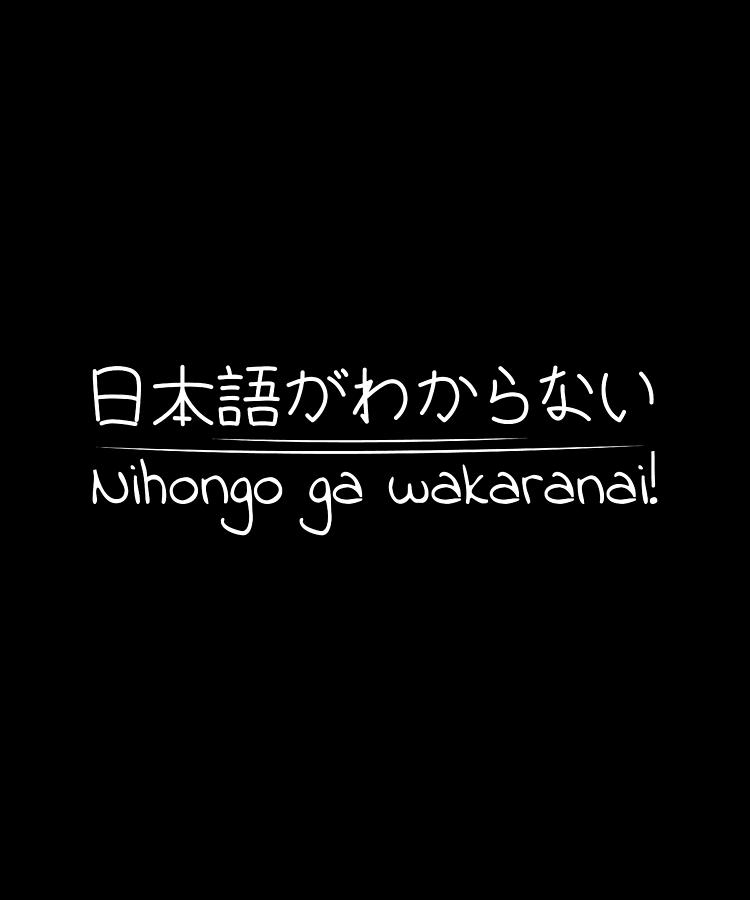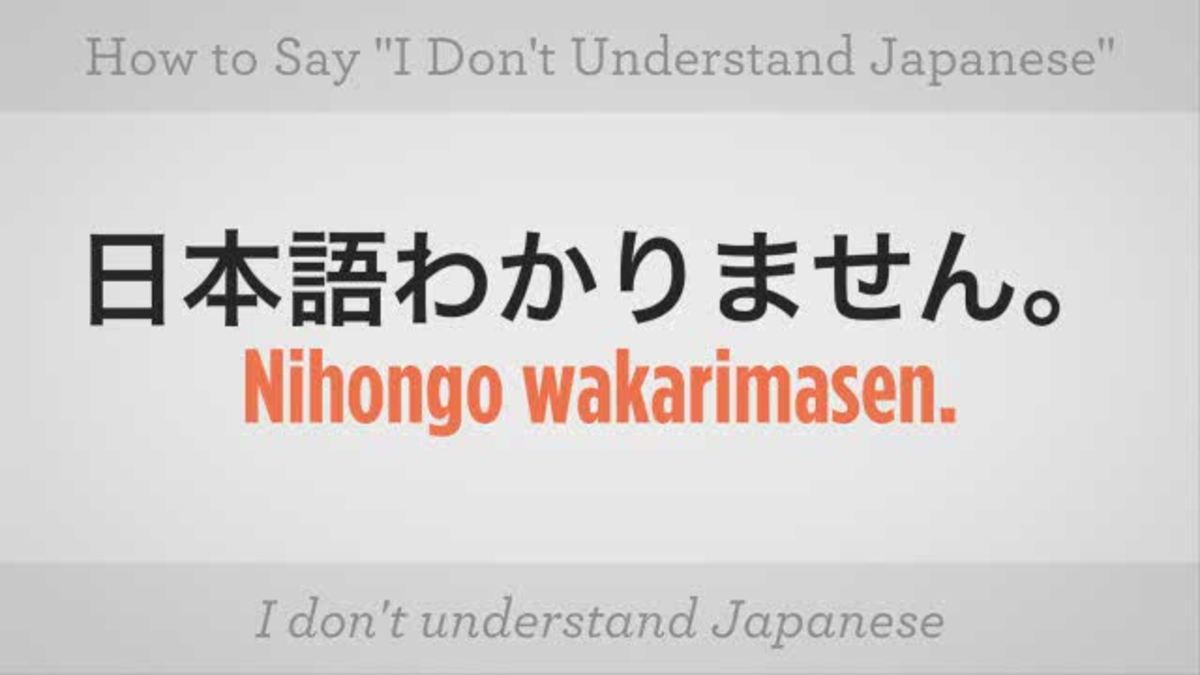Let’s face it, folks. Learning a new language can feel like trying to solve a Rubik's Cube blindfolded. And when it comes to Japanese, things can get even more twisted. But don’t sweat it! Whether you're diving headfirst into the world of Japanese or just trying to get by during your next trip to Tokyo, mastering the phrase "I don't understand" in Japanese is a game-changer. It’s like your emergency parachute when the language barrier gets too thick. So, buckle up, because we’re about to break it down for you!
You might be wondering, why bother learning this phrase? Well, let me tell you, life in Japan isn’t all sushi and anime. There will be moments when someone starts talking a mile a minute, and you’re left scratching your head like a confused puppy. That’s where this magical phrase comes in handy. It’s your ticket to clarity and communication without feeling like a total newbie.
Now, before we dive deep into the world of Japanese linguistics, let’s set the mood. This article is crafted to be your ultimate guide to mastering "I don't understand" in Japanese. We’ll cover everything from pronunciation tips to cultural nuances, all served with a side of humor and real-life examples. So, grab a cup of coffee, sit back, and let’s unravel this linguistic mystery together!
- Newgate Mall Ogden Utah Movies Your Ultimate Movie Watching Experience
- What Is The Doordash Promo Code Superbowl Your Ultimate Guide
Why Learning "I Don't Understand" Matters
Alright, let’s get real here. If you’re stepping into the land of the rising sun, you need a few survival phrases under your belt. And "I don't understand" is right up there with "hello" and "thank you." It’s not just about expressing confusion; it’s about showing respect and openness to learning. In Japanese culture, communication isn’t just about words; it’s about understanding and connecting. So, saying you don’t understand isn’t a sign of weakness—it’s a sign of willingness to engage.
Imagine this scenario: You’re at a ramen shop, and the chef starts explaining the history of his family recipe. Cool, right? But wait, you have no idea what he’s saying. Instead of nodding awkwardly and pretending you get it, you can confidently say, “I don’t understand.” The chef will appreciate your honesty, and who knows? You might even get a free bowl of ramen out of it!
Breaking Down the Phrase
The Basics: How to Say "I Don't Understand" in Japanese
So, here’s the golden phrase you’ve been waiting for: わかりません (Wakarimasen). Say it out loud. Go ahead, no one’s judging! This little gem is your go-to when you’re lost in translation. It literally means “I don’t understand” or “I don’t know.” Now, let’s break it down:
- Naruto Shippuden Fillers The Ultimate Guide For Fans
- G59 Meaning Unlocking The Mystery Behind The Code
- わ (wa) - means "understand" or "comprehend"
- かりません (karimasen) - the polite negative form of the verb
See? Not so scary, right? And don’t worry if your pronunciation isn’t perfect at first. Japanese speakers are super forgiving, especially when they see you’re making an effort.
Pronunciation Tips for Beginners
Now, let’s talk pronunciation. Japanese is a phonetic language, which means it’s pronounced exactly how it’s written. Cool, huh? But there are a few quirks you should know about. For instance, the “r” sound in Japanese is more like a soft “d” or “l.” So, when you say わかりません, it’s more like “wah-ka-ree-mah-sen.” Give it a shot!
Another thing to keep in mind is intonation. Japanese is a high-low tone language, meaning the pitch of your voice can change the meaning of a word. For わかりません, keep your tone level and polite. Think of it like a gentle wave, not a tsunami.
Common Misconceptions About Japanese
Myth vs. Reality
Before we move on, let’s clear up some common misconceptions about Japanese. A lot of people think Japanese is this impossibly complicated language that only geniuses can master. Wrong! Sure, it has its quirks, like three writing systems (hiragana, katakana, and kanji), but once you get the hang of it, it’s actually pretty logical.
Another myth is that Japanese people don’t speak English. While it’s true that not everyone is fluent, most people know enough to get by. And guess what? They’ll be thrilled when you try speaking Japanese, even if it’s just a simple phrase like わかりません.
Cultural Nuances to Keep in Mind
Here’s the thing about Japanese culture: it’s all about harmony and respect. When you say わかりません, you’re not just saying “I don’t understand.” You’re acknowledging that you’re in a situation where communication might be tricky, and you’re asking for help. This aligns perfectly with Japanese values, which emphasize teamwork and mutual understanding.
Also, keep in mind that directness isn’t always the norm in Japan. If someone says わかりません, they might not necessarily mean they have no idea what you’re talking about. It could be a polite way of saying they’re not sure or need more time to think. So, be patient and give them space to process.
Practical Scenarios Where You'll Use わかりません
Alright, let’s get practical. Here are some real-life situations where わかりません will come in handy:
- At a restaurant when the menu is all in Japanese
- When someone asks you a question you don’t understand
- During a tour or guided activity
- When shopping and the cashier starts explaining something
Trust me, these moments happen more often than you think. And every time you say わかりません, you’re building a bridge of communication. It’s like your secret weapon for navigating Japan like a pro.
Advanced Tips for Fluent Speakers
Leveling Up Your Skills
If you’re already comfortable with basic Japanese, here’s how you can take your skills to the next level. Instead of just saying わかりません, try adding more context. For example:
- もう一度お願いします (Mou ichido onegaishimasu) - Could you repeat that?
- ゆっくりお願いします (Yukkuri onegaishimasu) - Could you speak more slowly?
- 日本語が苦手です (Nihongo ga nigate desu) - I’m not good at Japanese.
These phrases will show that you’re not just saying わかりません out of habit; you’re actively trying to improve your understanding.
Resources to Help You Master Japanese
Now that you’ve got the basics down, here are some awesome resources to help you keep learning:
- JapanesePod101 - Great for audio learners
- Wasabi Japanese - Comprehensive lessons for all levels
- Tofugu - Fun and informative articles about Japanese culture and language
Remember, language learning is a journey, not a destination. So, take it one step at a time and enjoy the ride!
Final Thoughts and Call to Action
And there you have it, folks! The ultimate guide to saying "I don't understand" in Japanese. From pronunciation tips to cultural nuances, we’ve covered it all. Now, it’s your turn to put this knowledge into action. Next time you’re in Japan or talking to a Japanese speaker, don’t be afraid to say わかりません. It’s your key to better communication and deeper connections.
So, what are you waiting for? Leave a comment below and let us know how this article helped you. And if you found it useful, don’t forget to share it with your friends. Who knows? You might just inspire someone else to start their Japanese language journey today!
Table of Contents
- Unlocking the Mystery: "I Don't Understand" in Japanese
- Why Learning "I Don't Understand" Matters
- Breaking Down the Phrase
- Pronunciation Tips for Beginners
- Common Misconceptions About Japanese
- Cultural Nuances to Keep in Mind
- Practical Scenarios Where You'll Use わかりません
- Advanced Tips for Fluent Speakers
- Resources to Help You Master Japanese
- Final Thoughts and Call to Action



Detail Author:
- Name : Eldred Zieme MD
- Username : rohan.rosalinda
- Email : dbreitenberg@yahoo.com
- Birthdate : 1998-01-01
- Address : 5119 Greenholt Prairie Blockport, PA 07460
- Phone : 573.969.1289
- Company : Bruen Inc
- Job : Athletic Trainer
- Bio : Natus animi soluta iure dolorem. Aliquam perferendis et harum et. Et sit deleniti reiciendis accusamus ab accusantium. Est quia officiis voluptates et unde corporis.
Socials
tiktok:
- url : https://tiktok.com/@arianna229
- username : arianna229
- bio : Omnis illo debitis quas fugit sed sint eligendi facilis.
- followers : 1711
- following : 1066
twitter:
- url : https://twitter.com/arianna_real
- username : arianna_real
- bio : Hic id placeat quaerat voluptatibus consequatur quam odio. Quia ut doloremque et blanditiis. Aliquid est magni totam amet voluptas voluptas dolore expedita.
- followers : 143
- following : 647
instagram:
- url : https://instagram.com/greenfeldera
- username : greenfeldera
- bio : In distinctio quos labore rerum ut. Eligendi repellendus vel ea quo et.
- followers : 4974
- following : 772
linkedin:
- url : https://linkedin.com/in/arianna_id
- username : arianna_id
- bio : Maxime et architecto magnam assumenda.
- followers : 3622
- following : 949
facebook:
- url : https://facebook.com/agreenfelder
- username : agreenfelder
- bio : Et vel corrupti cum temporibus veritatis minus.
- followers : 4567
- following : 846